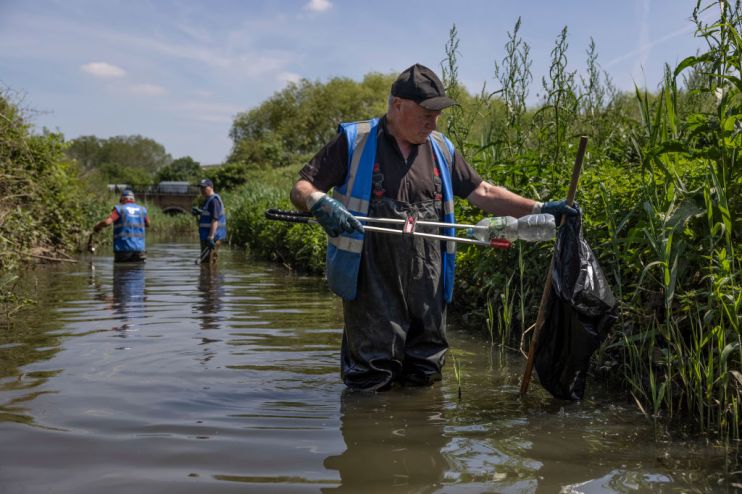Water industry pledges to invest its way out of sewage crisis despite missing spending targets last year

The leading water trade body has played down the role of fines in reforming the industry and tackling sewage spills and poor performance – and has instead argued the focus should be on investment to mprove the network.
Water UK outlined to City A.M. that companies had pledged to bring forward £56bn to tackle storm overflows, a persistent environmental menace that has polluted rivers and sea water across the UK.
A spokesperson said: “The Environment Agency reports very high levels of compliance at sewage works – 99 per cent last year. So while enforcement is vital if rules are broken, it will only ever be a tiny part of the effort to restore rivers to where they need to be. The vast majority of improvement will come from investment – where we are bringing forward £56bn to accelerate work on storm overflows”
Its emphasis on investment follows reports from watchdog Ofwat last December that water and wastewater companies are falling behind on their investment plans – leaving promised service improvements behind schedule or undelivered.
The industry’s regulator revealed 14 companies underspent their budget on improving their water network and eight companies underspent their budget for improving their wastewater network between 2020 and 2022.
Ofwat sets allowances for how much companies can invest over the price control period, to maintain and improve its water network, as part of its price review process which runs from 2020 to 2025.
Affinity Water and Northumbrian Water spent just 47 per cent and 48 per cent of their water enhancement allowance respectively, and Yorkshire Water and South West Water spent just 20 per cent and 39 per cent of their wastewater enhancement allowance respectively.
The main areas of underspend across both categories include drought resilience, improvements to sewage treatment works, improvements to storm tank capacity and reducing spill frequency.
Not just a slap on the wrist: Government urged to take tougher approach to sewage spills
Surfers Against Sewage has urged the government to hold firm with plans to clamp down on underperforming water companies if it wants to end sewage pollution across Britain’s rivers and seas.
The environmental activist group told City A.M. that Downing Street should not “let polluters off with a slap on the wrist” amid reports the Environment Secretary Therese Coffey is looking to scale back plans to raise the maximum cap for water company fines to £250m.
Izzy Ross, campaigns manager, said: “Current water company fines are a drop in the ocean, whilst bosses and shareholders swim in profits. Fines for polluting our waterways must impact the ways water companies run their business, otherwise they’re no deterrent at all.
“The Environment Secretary shouldn’t let polluters off with a slap on the wrist – you give these water companies an inch and they take a mile.”
Surfers Against Sewage contrasted the £965m companies paid out to shareholders with the £102m they were fined by regulatory agencies – which it described as “like pocket change.”
“It’s absolutely abhorrent that water companies are able to simply absorb the cost of fines whilst people and planet are forced to pay the price. Now is a time for the government to act and end sewage pollution, not take it easy on water companies’ relentless polluting and environmental destruction,” Ross argued.
Sam Hall, director of the Conservative Environment Network – an influential Westminster body backed by green Tory MPs – believed the government has been taking a tougher approach in recent years to ensure fines aren’t “just the cost of doing business.”
However, he urged the government to lift the cap on fines and called on Downing Street to introduce more policies to boost water quality alongside the stick of financial penalties for sewage spills.
Hall said: “While fines for criminal prosecutions are not capped, lifting the small £250,000 cap on civil offence fines for polluting water firms is an opportunity to ensure polluters always pay, even in less environmental severe breaches.
“The upcoming consultation on scrapping the cap is a welcome step. But more needs to be done to drive improvements to water quality, like designating more bathing water sites to empower communities with data to hold polluters accountable and rolling out new payments for farmers to reduce agricultural runoff.”
Government considers climbdown from proposals for £250m fines
Coffey is reportedly backing away from plans to hit water companies with fines of up to £250m for spilling sewage into rivers and seas – a 1,000 per cent increase in the cap proposed by her predecessor Ranil Jayawardena.
The government first announced plans last year to expand the use of civil variable monetary payments that the Environment Agency can issue, meaning sanctions can be imposed more often without protracted court cases.
When approached for comment, a Defra group spokesperson said: “We are clear that water companies must be held to account for poor performance. That’s why we are making it easier for regulators to enforce fines and hold them to account. More detail on this will be set out in our consultation in the spring.”
It is now launching a consultation, expected to take place this spring, on potential reforms to the water sector, including the £250,000 price cap.
The Environment Agency and Ofwat are currently engaged in the largest criminal and civil investigations into water company sewage discharges ever – across 2,200 treatment works, as a result of increased monitoring.
Six water companies currently face enforcement action from the two watchdogs including chief capital supplier Thames Water.